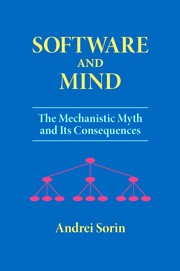Check nearby libraries
Buy this book

Addressing general readers as well as software practitioners, Software and Mind discusses the fallacies of the mechanistic ideology and the degradation of minds caused by these fallacies. Mechanism holds that every aspect of the world can be represented as a simple hierarchical structure of entities. But, while useful in fields like mathematics and manufacturing, this idea is generally worthless, because most aspects of the world are too complex to be reduced to simple structures. Our software-related affairs, in particular, cannot be represented in this fashion. And yet, all programming theories and development systems, and all software applications, attempt to reduce real-world problems to neat hierarchical structures of data, operations, and features.
Using Karl Popper's famous principles of demarcation between science and pseudoscience, the book shows that the mechanistic ideology has turned most of our software-related activities into pseudoscientific pursuits. Using mechanism as warrant, the software elites are promoting invalid, even fraudulent, software notions. They force us to depend on generic, inferior systems, instead of allowing us to develop software skills and to create our own systems. Software mechanism emulates the methods of manufacturing, and thereby restricts us to high levels of abstraction and simple, isolated structures. The benefits of software, however, can be attained only if we start with low-level elements and learn to create complex, interacting structures.
Software, the book argues, is a non-mechanistic phenomenon. So it is akin to language, not to manufactured objects. Like language, it permits us to mirror the world in our minds and to communicate with it. Moreover, we increasingly depend on software in everything we do, in the same way that we depend on language. Thus, being restricted to mechanistic software is like thinking and communicating while being restricted to some ready-made sentences supplied by an elite. Ultimately, by impoverishing software, our elites are achieving what the totalitarian elite described by George Orwell in Nineteen Eighty-Four achieves by impoverishing language: they are degrading our minds.
Check nearby libraries
Buy this book

Previews available in: English
Subjects
software, programming, mind, mechanism, mechanistic, computer science, software engineering, science, pseudoscience, principles of demarcation, levels of abstraction, hierarchical structure, complexity, reductionism, atomism, determinism, philosophy of science, philosophy of language, philosophy of mind, structured programming, object-oriented, database, relational database, relational model, totalitarianism, software totalitarianism, totalitarian democracy, elite, software elite, free will, responsibility, Newspeak| Edition | Availability |
|---|---|
|
1
Software and Mind: The Mechanistic Myth and Its Consequences
2013, Andsor Books
Hardcover
in English
- First edition
0986938904 9780986938900
|
aaaa
|
Book Details
Table of Contents
Edition Notes
Classifications
Contributors
The Physical Object
ID Numbers
Links outside Open Library
Community Reviews (0)
Feedback?| February 10, 2023 | Edited by ImportBot | import existing book |
| January 22, 2023 | Edited by Gustav-Landauer-Bibliothek Witten | persons |
| August 8, 2020 | Edited by Gustav-Landauer-Bibliothek Witten | person |
| July 30, 2020 | Edited by Gustav-Landauer-Bibliothek Witten | persons |
| January 18, 2015 | Created by Andrei Sorin | Added new book. |











